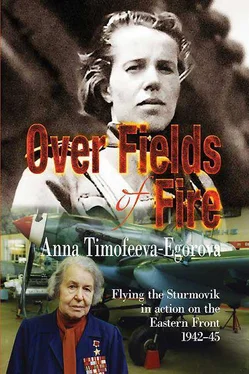I spent three weeks in the Botkinskaya hospital and when I got back to the pit I found out that Andrey Dikiy had died. He had snagged a bare electric cable with the hooks of the reinforcing rods. The death of our workmate shook us all…
After discharge from the hospital I wasn’t allowed to work and the shaft committee 15 15 Translator’s note — local trade union.
offered me a place in a floating holiday home. I refused and decided to see my mother in the village. I hadn’t written her about my visit but when I got off the train at the Kouvshinovo station both my mother and my sister Maria — my godmother — were there to meet me.
“How did you find out that I’d be coming?” I asked my sister. Maria explained it simply, “Mum had some sort of dream, then she came over early in the morning and said: “Let’s go to meet Annoushka 16 16 Editor’s note — literally, ‘Little Anna’.
— she’ll be coming today”. And you know our mum — she’s like a commander — if she gives an order you carry it out without arguing!”
Mother stopped Maria, addressing me: “My girl, why have you grown so thin? And you’re so pale…”
“I’m trainsick”, I explained, “you know how winding the railroad beyond Torzhok is, don’t you?”
“Oh yes, God forbid”, mum said. We got into a cart and went to Volodovo…
My holiday flashed past imperceptibly and now I was at the shaft again. From September I’d been studying at the Metrostroy workers’ faculty — sometimes in the mornings, sometimes in the evenings — in shifts. We worked six hours a day, never sparing ourselves no matter what. Sometimes we stayed in the shaft for two shifts in a row. Once, having worked the evening shift, I stayed for the night. I remember that we were binding fittings in the tunnel. My arms grew terribly tired, lifted all the time holding up the wire-cutters. And it was muggy and hot in the tunnel and I was desperate for a sleep, especially by morning. Someone, curled into a ball, had fallen asleep on a step of the scaffolding. And suddenly, as if on purpose, the head of the shaft Gotseridze and the Narkom 17 17 People’s commissar, or minister.
for Railways came down underground. Noticing the sleeper they stopped.
“Why are there children in the shaft?” The Narkom asked sternly.
“They are Comsomol members”, Gotseridze answered.
“Send them up top immediately!”
They would have too, had we not mutinied. Standing up by fair means or foul for our right to work in the shaft we added years to our age. It was harder for those who were not tall enough. In a week it was all sorted out — we were tying fittings again but doing our best not to catch the bosses’ eyes.
There was such an atmosphere on our shaft that everyone rushed to the pit-face with a kind of joy, with pleasure. It was a blessing — to go to work cheerfully and to consider yourself useful and necessary to the people. To be conscious of the fact that something done by you, by your hands, would remain in your dear land! Nowadays, so many years later, no matter how many times I ride through the ‘Red Gate’ Metro station it seems to me to be the most beautiful. And when they say there are better ones I get angry. My Comsomol youth is set firm in this station, in the cold stone…
What can I say, we, the youth, had amazingly high morale back then. We always wanted to do something, to learn something. In the beginning Tosya Ostrovskaya and I passed tests to get a “Ready for work and defence!” badge 18 18 Translator’s note — a set of sports and fitness tests.
, a “Ready for medical work in defence!” one 19 19 Translator’s note — a set of tests on primary medical skills.
, then for the “Voroshilov marksman” 20 20 Translator’s note — shooting skills award for civilians.
and even this wasn’t enough. We joined a choir, and began to go to Sokolniki 21 21 Translator’s note — a recreation park in Moscow.
for roller-skating. Tosya skated well but I had already smashed my elbows and knees but stubbornly kept getting up from the asphalt, kept practising and at long last — hurray! — I learned how.
4. Out of the pit and into the sky
Once in the shaft lunchroom I read a recruiting notice for the Metrostroy aeroclub glider and flying groups. Only recently the Comsomol ’s IX Conference had put out the call: “ Comsomol members — take to the air!” Once we were visited at the Metrostroy by some field editors from the Comsomol’skaya Pravda newspaper promoting it. At the same time our own paper — Udarnik Metrostroya 22 22 Translator’s note — literally, “ Comsomol Crack Worker”.
— reported that the Metrostroy aeroclub had been granted territory for an aerodrome not far from the Malye Vyazemy station, 4 U-2 biplanes and 3 gliders. Future airmen and parachutists were invited to pull up stumps and build a field aerodrome and hangars for the planes and gliders. Well, if they need stumping we’d do the stumping! To be honest, I’d secretly dreamed of flying for a long time, the way people dream about far countries, alluring but unattainable. And now, having read the recruitment notice I plucked up my courage and made the first step — I headed to the given address — 3, Kuibysheva Street.
I found the building I needed but was afraid to go in. I had already read all the posters, the wall newspaper, the notices hung in the corridor, but still couldn’t find the guts to approach the door marked “Entrance examination”.
“Who are you waiting for, young lady?” A serviceman in a flyer’s uniform asked me.
I couldn’t see his face: my eyes were fixed on a gold-embroidered badge on his sleeve — the Air Force emblem… Many years later POW airmen in the Kostrinskiy concentration camp would present me with exactly the same emblem. They braided a handbag from the straw they slept on and embroidered the Air Force emblem (an airplane propeller) on it with my initials: “A.E.” — Anna Egorova — and passed it to me in secret… But back then I began to say, stammering, that I longed to join the aeroclub’s flying school and had even brought an application.
“An application is not enough”, the airman said. “You need references from the site, from the Comsomol organisation, a medical certificate, an education certificate and a birth record. When you collect all the papers, come with them to the credentials committee. The committee will decide whether you’ll be accepted or not.”
Having thanked the airman, and inspired by making a start, I dashed outside and running at full speed rushed towards the Red Gate, to the pit. The Comsomol committee approved my decision but in the brigade…
“What’s got into you?” Vasya Grigoriev gloomily commented. “You’re better off going to an institute to study — let blokes do the flying.”
“And this weakling wants to be a flyer! She hasn’t got over her electric shock yet!” Tosya Ostrovskaya declared.
And her my bosom friend! We even slept together, so to speak — our beds stood next to each other in the dormitory, we worked in the same brigade, studied together at the workers’ faculty. Even our skirts and blouses were ‘interchangeable’: one piece for both of us. One day she wore skirt and blouse and I wore a dress, the next day it would be the other way around. Tosya dreamed of becoming a doctor but I hadn’t decided yet what to do and we used to argue a lot because of this. Running ahead I’ll say that Antonia Sergueevna Ostrovskaya would become a doctor and spend the whole war at the front as a surgeon. But back then she was keen for me to go to medical school together with her.
Читать дальше












